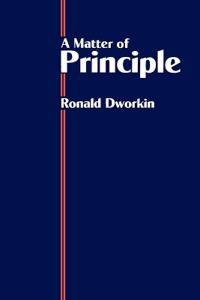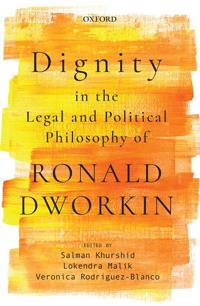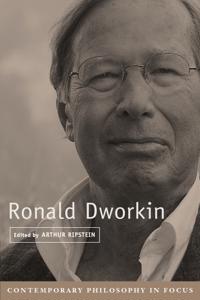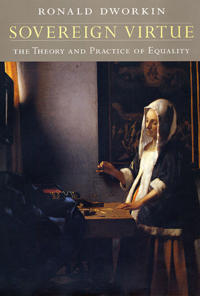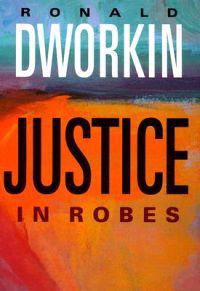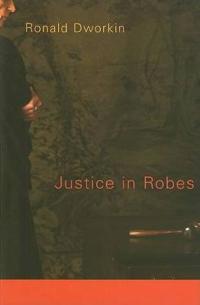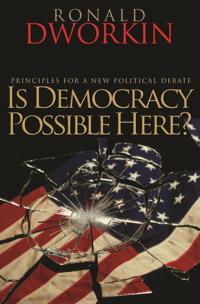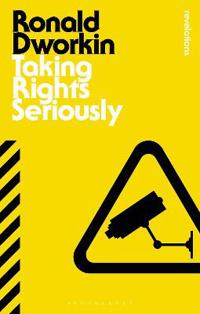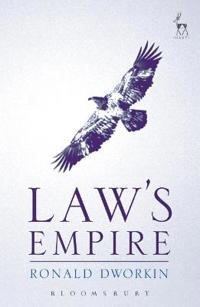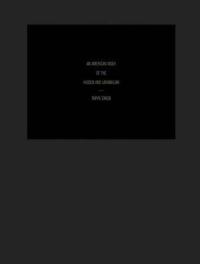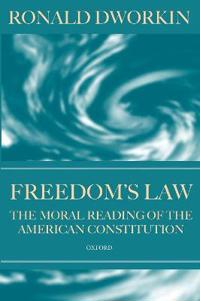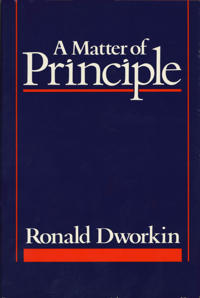A Matter of Principle (Häftad)
avRonald Dworkin
ISBN: 9780198255741 - UTGIVEN: 198612A selection of important writings which together suggest that legal philosophy is the nerve of legal reasoning.[...]
Dignity in the Legal and Political Philosophy of Ronald Dworkin
ISBN: 9780199484171 - UTGIVEN: 2018-07Ronald Dworkin (1931-2013), an American legal philosopher, jurist, and scholar, was a stalwart advocate of human rights and dignity who developed a formidable scholarly combination of law and moral integrity. He propounded some of the most influential theories of law and morality in modern jurisprud[...]
Ronald Dworkin (Pocket)
avArthur (EDT) Ripstein
ISBN: 9780521664127 - UTGIVEN: 2007-05Ronald Dworkin occupies a distinctive place in both public life and philosophy. In public life, he is a regular contributor to The New York Review of Books and other widely read journals. In philosophy, he has written important and influential works on many of the most prominent issues in legal and [...]
Sovereign Virtue (Häftad)
avRonald Dworkin
ISBN: 9780674008106 - UTGIVEN: 200203Equality is the endangered species of political ideas. Even left-of-centre politicians reject equality as an ideal: government must combat poverty, they say, but need not strive that its citizens be equal in any dimension. In this new book the author insists, to the contrary, that equality is the in[...]
Justice in Robes (Inbunden)
avRonald Dworkin
ISBN: 9780674021679 - UTGIVEN: 200604How should a judge's moral convictions bear on his judgments about what the law is? Lawyers, sociologists, philosophers, politicians and judges all have answers to that question: these range from 'nothing' to 'everything'. In his new book Ronald Dworkin argues that the question is much more complex [...]
Justice in Robes (Häftad)
avRonald Dworkin
ISBN: 9780674027275 - UTGIVEN: 200805How should a judge's moral convictions bear on his judgments about what the law is? In his new book, Ronald Dworkin argues that the question is much more complex than it has often been taken to be and charts a variety of dimensions - semantic, jurisprudential, and doctrinal - in which law and morals[...]
Justice for Hedgehogs (Häftad)
avRonald Dworkin
ISBN: 9780674072251 - UTGIVEN: 201302The fox knows many things, the Greeks said, but the hedgehog knows one big thing. In his most comprehensive work, Ronald Dworkin argues that value in all its forms is one big thing: that what truth is, life means, morality requires, and justice demands are different aspects of the same large questio[...]
Taking Rights Seriously (Häftad)
avRonald Dworkin
ISBN: 9780674867116 - UTGIVEN: 197707What is law? What is it for? How should judges decide novel cases when the statutes and earlier decisions provide no clear answer? Do judges make up new law in such cases, or is there some higher law in which they discover the correct answer? Must everyone always obey the law? If not, when is a citi[...]
Is Democracy Possible Here? (Häftad)
avRonald Dworkin
ISBN: 9780691138725 - UTGIVEN: 200807Politics in America are polarized and trivialized, perhaps as never before. In Congress, the media, and academic debate, opponents from right and left, the Red and the Blue, struggle against one another as if politics were contact sports played to the shouts of cheerleaders. The result, Ronald Dwork[...]
How Karl Marx Can Save American Capitalism (Inbunden)
avRonald Dworkin
ISBN: 9781498509725 - UTGIVEN: 2015-02When the Cold War ended, some people called it the "end of history." Capitalism and liberal democracy had prevailed. Later, when the West clashed with radical Islam, Americans realized history hadn't ended after all-at least not abroad. Now, in How Marx Can Save American Capitalism, Ronald W. Dworki[...]
Taking Rights Seriously (Häftad)
avRonald Dworkin
ISBN: 9781780937564 - UTGIVEN: 201304A landmark work of political and legal philosophy, Ronald Dworkin's Taking Rights Seriously was acclaimed as a major work on its first publication in 1977 and remains profoundly influential in the 21st century. A forceful statement of liberal principles - championing the legal, moral and political r[...]
Taking Rights Seriously (e-bok)
avRonald Dworkin
ISBN: 9781780938332A landmark work of political and legal philosophy, Ronald Dworkin's Taking Rights Seriously was acclaimed as a major work on its first publication in 1977 and remains profoundly influential in the 21st century. A forceful statement of liberal principles - championing the legal, moral and political r[...]
Law's Empire (Storpocket)
avRonald Dworkin
ISBN: 9781841130415 - UTGIVEN: 199810In this reprint of Laws Empire,Ronald Dworkin reflects on the nature of the law, its given authority, its application in democracy, the prominent role of interpretation in judgement, and the relations of lawmakers and lawgivers to the community on whose behalf they pronounce. For that community, La[...]
Taryn Simon (Inbunden)
avSalman Rushdie, Christina Kukielski, Frank Ronald Dworkin
ISBN: 9783775735063 - UTGIVEN: 201305First published in 2008, and now commanding high prices second-hand, Taryn Simon's "An American Index of the Hidden and Unfamiliar" reveals objects, sites and spaces that are integral to America's foundation, mythology or daily functioning, but which remain inaccessible or unknown to a public audien[...]
En fråga om jämlikhet (Häftad)
avRonald Dworkin
ISBN: 9789171731388 - UTGIVEN: 200001Dworkins böcker utgör en frontalattack på de båda föreställningar, utilitarismen och rättspositivismen, som dominerat rättsfilosofin under nittonhundratalet. ?
Dworkins teorier har sänt ut chockvågor bland forskare i juridik och rättsfilosofi.
Time Magazine[...]Religion utan gud (Inbunden)
avRonald Dworkin
ISBN: 9789171734310 - UTGIVEN: 2014-06-10"Religion utan gud", som blev den framstående juristen och filosofen Ronald Dworkins sista bok, utgår från Albert Einsteins reflektioner kring religionens väsen. Enligt Einstein utgjordes "den sanna religiositeten" av upplevelsen av att det för oss ogenomträngliga "uttrycker den högsta visdom[...]
Freedom's Law (Häftad)
avRonald M. Dworkin
ISBN: 9780198265573 - UTGIVEN: 1999-07Written by the world's best-known political and legal theorist, Freedom's Law: The Moral Reading of the American Constitution is a collection of essays that discuss almost all of the great constitutional issues of the last two decades, including abortion, euthanasia, capital punishment, homosexualit[...]
Freedom's Law: The Moral Reading of the American Constitution (Pocket)
avDworkin, Ronald D.
ISBN: 9780674319288Ronald Dworkin argues that Americans have been systematically misled about what their Constitution is, and how judges decide what it means. The Constitution, he observes, grants individual rights in extremely abstract terms. The First Amendment prohibits the passing of laws that "abridge the freedom[...]
Matter of Principle (Häftad)
avRonald M. Dworkin
ISBN: 9780674554610 - UTGIVEN: 198610This is a book about the interplay of urgent political issues and hotly debated questions of moral philosophy. The controversies it joins are old; but history has given them fresh shape. For example, whether judges should and do make law is now of more practical importance than ever before, as recen[...]
Life's Dominion (Häftad)
avRonald M. Dworkin
ISBN: 9780679733195 - UTGIVEN: 2004-08One of the country's most distinguished scholars presents a brilliantly original approach to the twin dilemmas of abortion and euthanasia, showing why they arouse such volcanic controversy and how we as a society can reconcile our values of life and individual liberty.[...]

